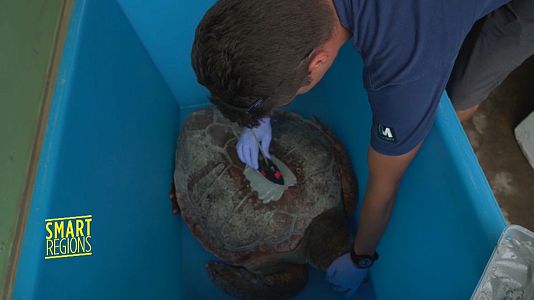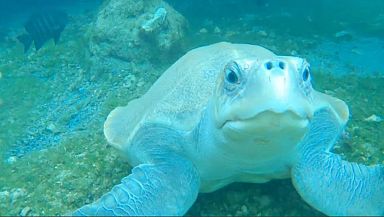Scientists on Reunion Island in the Indian Ocean have enlisted sea turtles to help with vital research into tropical cyclones
Reunion Island is just one of many places in the Indian Ocean affected by cyclones. The results can be devastating and even life-threatening for those who live in the region.
Now, scientists working on a unique project are starting to learn more about the nature and behaviour of these weather phenomena with the help of turtles.
The ReNovRisk-Cyclones project, supported by the European Union, aims to improve modelling tools and knowledge of tropical cyclones to make the region safer.
Cyclones draw their immense power from the sea, and that is where the turtles come in very useful.
"India", a loggerhead turtle, arrived at the Kelonia centre on Reunion Island a few months ago. She had been injured.
Now she's been cured and researchers have released her back into the open sea near Oman.
India has had her freedom restored, but although she might not know it, she is also now carrying out vital work for the scientists.
Turtles to the rescue
The turtle has been equipped with a GPS device that sends back vital information back to the researchers about the water temperature at various depths.
"The turtles in this programme are an incredible asset," explained turtle specialist Mathieu Barret at the Kelonia Centre. "Just to be able to collect the depth-related temperature data that will allow Renovrisk scientists to fine-tune their cyclone forecasting programme."
Specialists at French weather service Meteo France in St. Denis study the data sent from the turtles.
It gives them details of the temperature of the water up to a depth of around 300 metres. They're taking an innovative approach.
They say that because of climate change, cyclones are likely to become stronger, hence the importance of combining meteorological and oceanic data.
"Visually, cyclones are very aesthetic, cyclone specialist Philippe Caroff told Smart Regions. "But at the same time, we know that if they ever strike inhabited areas... we know that at the same time, a lot of suffering is generated. I work with the devil's beauty."
Cooperation between the partner countries is vital to the success of the project.
Elisa Rindraharisaona is a seismologist from Madagascar and has been working as part of the team for two years.
"We share the results of our findings," explained Elisa. "The information from the turtles, for example... from the seismic observations, from the GPS, and then we combine everything to try to understand and forecast cyclone meteorology."
Renovrisk has a total budget of €1.5 million, 85% of which is covered by the EU and the remaining 15% by Réunion and the French State in equal parts.
France is piloting the project, in which Madagascar, Mozambique, the Seychelles and Mauritius are all taking part. Across the southwest Indian Ocean basin, 15 countries are benefiting from the programme.
India joins about ten turtles already released, carrying on their backs the hope and means of telling us more about cyclones and the sea.













